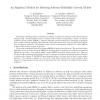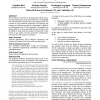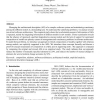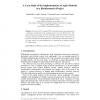168 search results - page 11 / 34 » Software risk management barriers: An empirical study |
110
click to vote
ESE
2002
15 years 1 months ago
2002
Estimating remaining defects or failures in software can help test managers make release decisions during testing. Several methods exist to estimate defect content, among them a v...
193
click to vote
CSCW
2011
ACM
14 years 8 months ago
2011
ACM
We describe the activities of the Empirical Software Engineering (ESE) group at Microsoft Research. We highlight our research themes and activities using examples from our researc...
125
Voted
JSS
2010
14 years 8 months ago
2010
Managing the architectural description (AD) of a complex software system and maintaining consistency among the different models is a demanding task. To understand the underlying p...
JSW
2008
15 years 1 months ago
2008
Intermediate COCOMO Model computes effort as a function of program size and a set of cost drivers. Effort adjustment factor (EAF) is calculated using 15 cost drivers. EAF is an imp...
XPU
2007
Springer
15 years 8 months ago
2007
Springer
From July 2005 to August 2006, a bioinformatics project experienced a substantial transformation by adopting Scrum and some XP practices. The paper reveals project risks, previous ...




